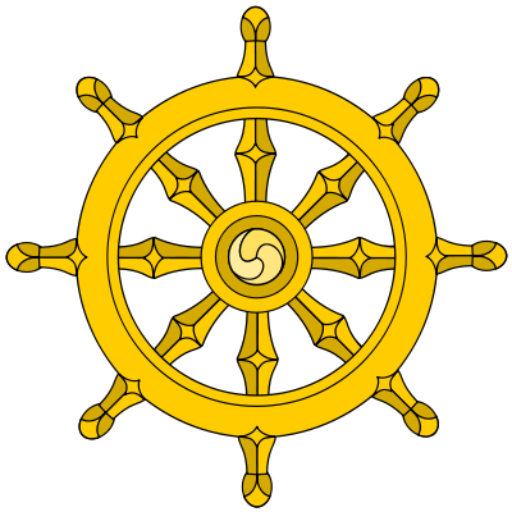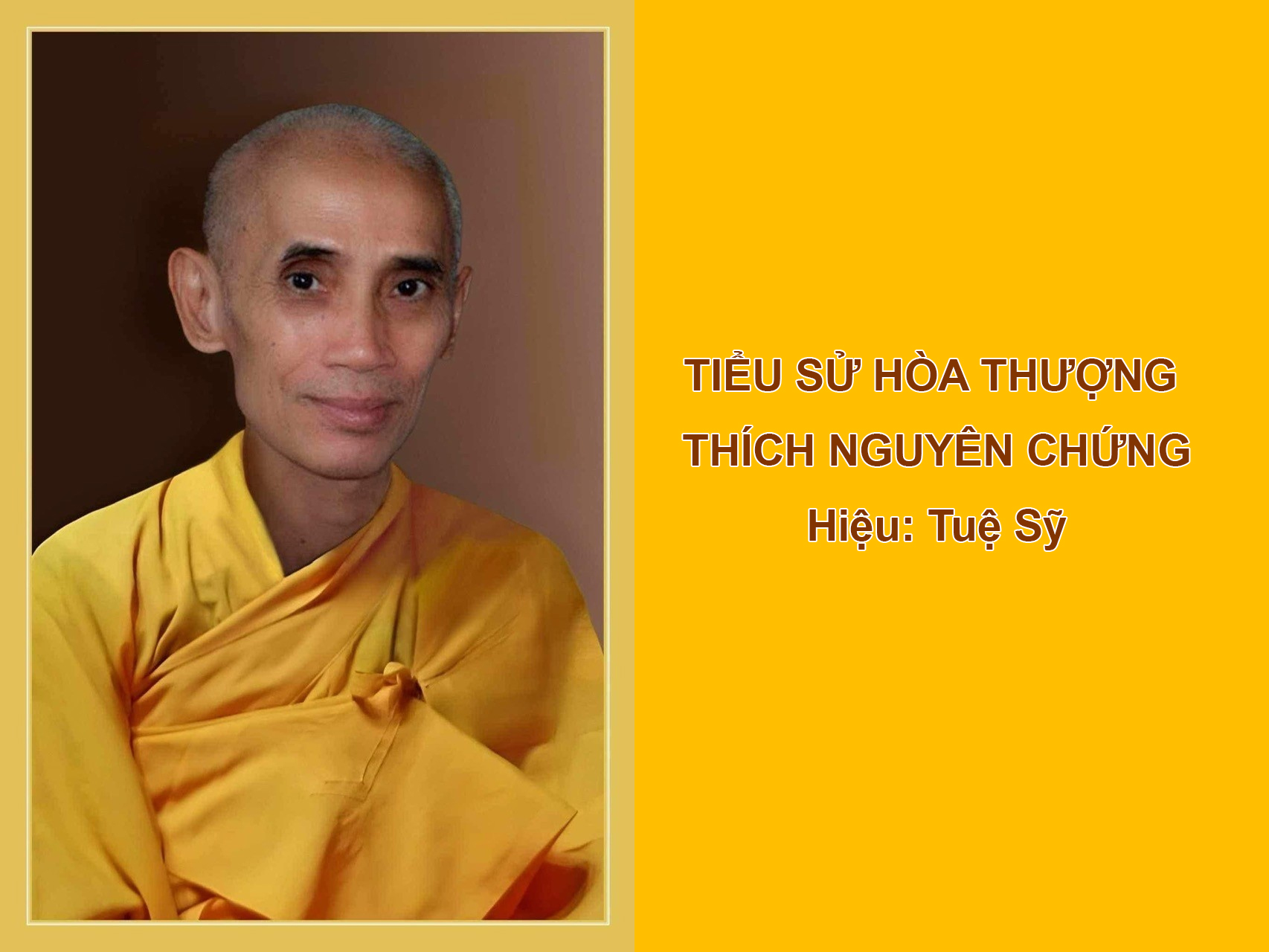
The Most Venerable Thích Tuệ Sỹ (Thầy), whose secular name is Phạm Văn Thương, was born on February 15, 1943, according to his birth certificate (his family adjusted his age so he could go to school early). His actual birthdate is April 5, 1945 (The 23rd day of the second lunar month in the year of the Rooster), in Paksé Province, Laos.
Parentage:
• Father: Mr. Phạm Văn Phận, Dharma name Trung Thảo
• Mother: Mrs. Đặng Thị Chín, Dharma name Diệu Chánh.
• Home village: Nghĩa Ninh commune, Đồng Hới district, Quảng Bình province, Central Vietnam.
In his childhood, Thầy often accompanied his mother to the nearby village temple, creating the conditions for the moment when he decided to stay at the temple permanently. In 1952, due to the war, his parents sent him to the Trang Nghiêm Buddhist Temple in Tan An village of Paksé Province, Laos, to learn under the guidance of the abbot and founder of Trang Nghiêm Buddhist Temple.
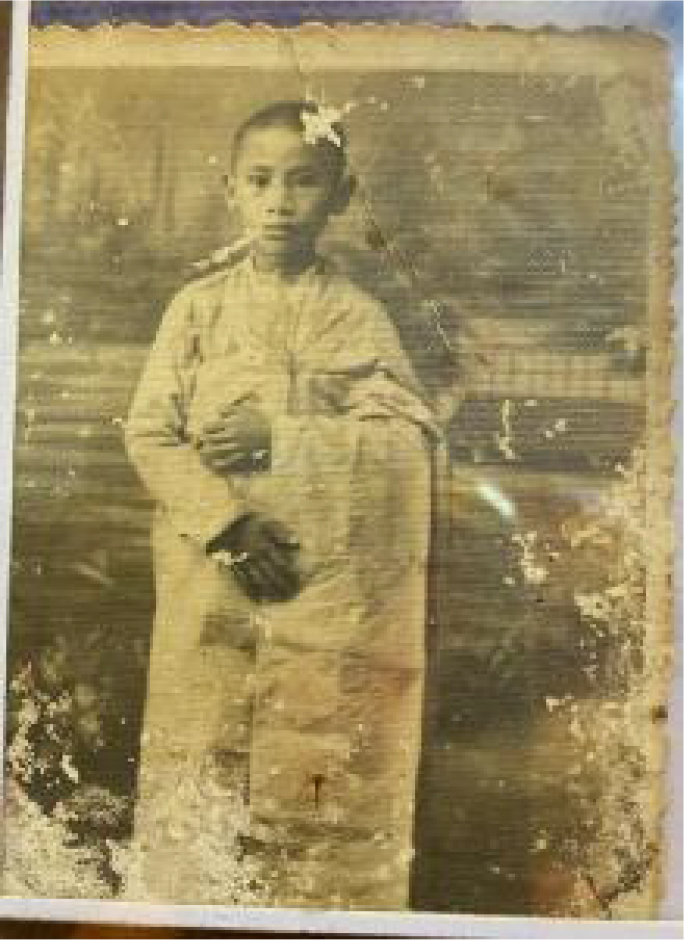
Photo taken when The Most Venerable was 12 years old
At the age of 9, in 1954, Thầy officially entered monastic life at this temple. Recognizing Thầy's unique abilities and disposition, the abbot advised his family to bring Thầy back to Vietnam for further education. In 1960, Thầy returned to Vietnam and lived away from his family at Bồ Đề Temple, a small Buddhist temple near Gia Hội Bridge in Huế province. Thầy carried with him the Lotus Sutra in Chinese during this period. However, in 1968, due to the upheavals of the Mậu Thân Lunar New Year, he lost this set of scriptures at Từ Đàm Pagoda in Huế. Thầy's uncle, the Most Venerable Thích Trí Quang, a renowned Buddhist leader in the 1960s, was also living in Huế at that time.
Nevertheless, with an inherently independent personality, Thầy embarked on solitary journeys through various regions: Huế, Nha Trang, Sài Gòn, Tiền Giang, and other provinces in the South, leading a self-reliant life in various monasteries, both large and small. In 1961, at the age of 16, Thầy took novice ordination (Sa-di) with the Most Venerable Thích Hành Trụ in Sài Gòn. During this year, he underwent the first Sa-di ordination summer retreat at Phật Ân Pagoda in Tiền Giang Province, alongside the Most Venerable Trí Minh. Eventually, the Most Venerable Thích Trí Thủ accepted Thầy into the Quảng Hương Già-lam Monastery in Gò Vấp, Sài Gòn. Thầy graduated from the Saigon College of Buddhist Studies in 1964 and pursued further studies at Van Hanh University's Buddhist Studies department for the academic year 1965. Recognizing Thầy's talent through his writings on Vasubandhu and Abhidharma-kosa-sastra, the Most Venerable Thích Đức Nhuận was the first to discover the young monk's potential and introduced him to Van Hanh University. At that time, the Most Venerable Thích Mãn Giác, the deputy director of the university, proposed conferring a Bachelor's degree upon Thầy, an offer Thầy politely declined.
Thầy received a special appointment as a Professor at Van Hanh University from 1970 due to his valuable contributions to Buddhist studies and philosophical treatises. His notable works include "Đại Cương Về Thiền Quán" (General Introduction to Zen Meditation), introduced by the Most Venerable Thích Đôn Hậu and published by Liên Hoa in 1967, "Triết Học về Tánh Không" (Philosophy of Emptiness), published by An Tiêm in Saigon in 1970, among others. Subsequently, Thầy also served as the Head of the Buddhist Studies Department at the university
during the academic year 1972-1973. Proficient in classical Chinese, Thầy was multilingual, with a command of languages such as English, French, Lao, Thai, Japanese, and Tibetan, in addition to being well fluent in Pali and Sanskrit. Thầy also possessed an understanding of German, conducting in-depth research on Heidegger and Hoelderlin. The Vietnamese translation, printing, and reissuing of volumes 2 and 3 of D.T. Suzuki's famous "Thiền Luận" (Essays in Zen Buddhism) from 1972 to 1975 were accomplished by Thầy.
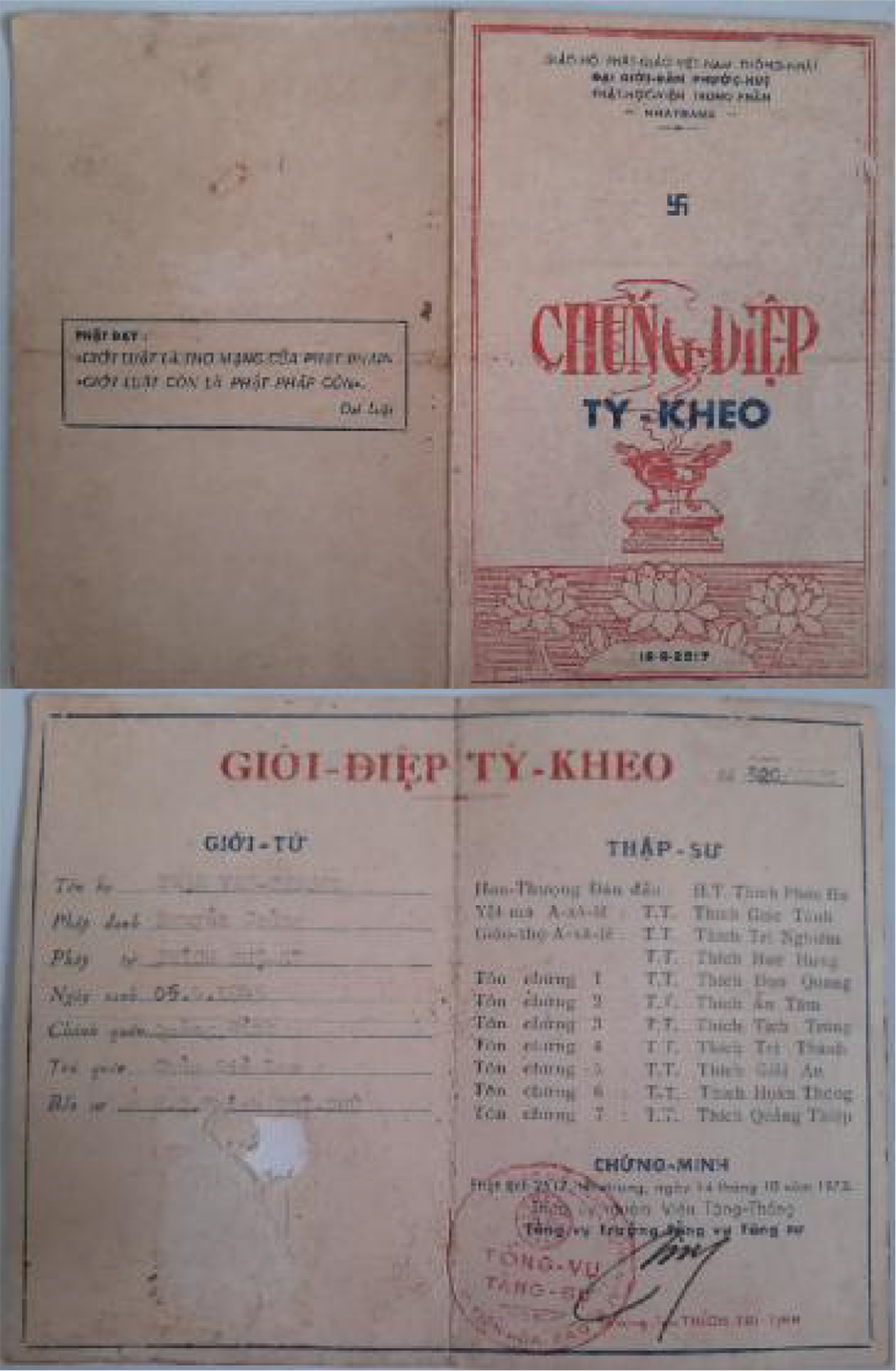
1973, seeing Thầy's unwavering commitment to research and teaching, the Most Venerable Thích Trí Thủ urged Thầy to prepare for the Bikkhu ordination, and Ven. Sa-di Tuệ Sỹ formally received Bikkhu precepts at the Phước Huệ Monastic Assembly held at the Central Buddhist Institute in Nha Trang in 1973, with the Most Venerable Thích Phúc Hộ as the Assembly Head, the Most Venerable Thích Giác Tánh as the Karman Monk, and the Most Venerable Thích Trí Nghiêm and the Most Venerable Thích Huệ Hưng as the Dharma teachers.
The Most Venerable Tuệ Sỹ not only delved deeply into Therevada Buddhism and Mahayana but also demonstrated proficiency in Western philosophy, literature, poetry, and music. He conducted direct research from original works of renowned Chinese writers and poets such as Tô Đông Pha, Lý Hạ, and Đỗ Phủ. In addition to his philosophical and Buddhist studies, he authored poetic works such as 'Tô Đông Pha, Những Phương Trời Viễn Mộng' (Tales of Tô Đông Pha's Distant Horizons, Ca Dao publishing, Saigon, 1973).
In the realm of music, Most Venerable Tuệ Sỹ played the guitar, violin, piano, and flute. He explored traditional Vietnamese music and exhibited a profound appreciation for Western classical music. The Most Venerable Tuệ Sỹ wrote numerous poems, short stories, and outstanding literary critiques, most of which were published in the magazines Khởi Hành (Embarking) (1969-1972) and Thời Tập (The Times) (1973-1975) in Saigon. Concurrently, he served as the General Secretary of the Editorial Board for the magazine Tư Tưởng (Ideology) of Van Hanh University. His remarkable collection of classical Chinese poems, ‘Ngục trung mỵ ngữ’ (A Prisoner’s Somniloquies), was composed during his imprisonment after 1975. Later volumes such as 'Giấc mơ Trường sơn' (Truong Son Mountains Dreams), 'Những điệp khúc cho dương cầm' (Refrains for Piano), and 'Thiên lý độc hành' (Alone on a Lengthy Journey) were translated into English, French, and Japanese, gaining widespread distribution overseas.
Since a young age, Most Venerable Tuệ Sỹ memorized texts such as the Lotus Sutra, Diamond Sutra, Śrīmālā Siṃhanāda Sutra, Vimalakirti Sutra, and so on. Vimalakirti Sutra, which emphasizes the spirit of practicing the Dharma without the need for ritualistic attire or
ceremonial grandeur, significantly influenced his life and practice. Thầy can be said to have drawn inspiration from the ideals presented in this sutra and the Lotus Sutra throughout his lifelong journey of learning and practicing the Dharma. Deeply versed in Buddhist knowledge, Thầy Tuệ Sỹ wrote a dissertation titled "Huyền thoại Duy-ma-cật" (The Legend of Vimalakirti) and, following the ideal model presented in this sutra, fearlessly engaged in public service. He became an emblematic figure for peaceful advocacy of human rights and religious freedom in Vietnam.
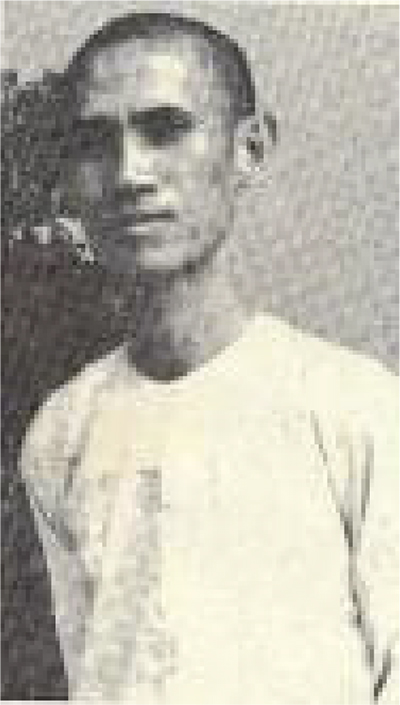
In 1973, Most Venerable Tuệ Sỹ returned to Nha Trang as the Academic Director of the Central Buddhist Institute, appointed by the Most Venerable Thích Trí Thủ, who served as the Director of the Institute.
In 1975, while Most Venerable Tuệ Sỹ was teaching at the Central Buddhist Institute in Nha Trang, the institute closed following the events of April 30, 1975. He retreated to seclusion in a temple on the outskirts of Vạn Giã Forest, approximately 60 km from Nha Trang. By 1977, Most Venerable Tuệ Sỹ sought refuge in Saigon at Tập Thành Pagoda in Bình Thạnh district. In 1978, he was detained by the authorities for an untried three-year period (for illegal residency). He was eventually released at the end of 1980.
Due to the circumstances of his wandering years and imprisonment, noticing the compromised state of monastic life, Most Venerable Tuệ Sỹ recognized the potential impurity and requested to re-ordain under the Bikkhu precepts at Quảng Hương Già-lam in 1982. The Most Venerable Thích Trí Quang served as the preceptor, the Most Venerable Thích Trí Thủ as the Assembly Head, and the Most Venerable Thích Trí Tịnh as the proclaimer.
From 1980 to 1984, Most Venerable Tuệ Sỹ served as the Dharma Teacher for a special training program at Quảng Hương Già-lam Monastery, directed by the Most Venerable Thích Trí Thủ, who served as the Director.
In April 1984, Most Venerable Tuệ Sỹ was arrested again along with the Professor and Most Venerable Thích Trí Siêu Lê Mạnh Thát and 17 monks, nuns, and lay Buddhists. During the extended trial in late September 1988, rejecting appointed defense lawyers and opting to defend themselves, the two monks were sentenced to death by the authorities for "conspiring to overthrow the government."
Due to the active efforts of individuals both inside and outside the country, along with the intervention of international human rights organizations, Hanoi was compelled to hastily reduce the sentences of the two monks to 20 years of rigorous imprisonment. Most Venerable Tuệ Sỹ was incarcerated in Xuân Lộc, Đồng Nai, and later transferred to the A-20 prison in Phú Yên province. In October 1994, due to his resistance within the prison, Most Venerable Tuệ Sỹ was separated and moved to the Ba Sao detention center in the northern region. For his courageous activism, Thích Tuệ Sỹ received the Hellman-Hammett Awards for Human Rights Defenders from the Human Rights Watch organization on August 3, 1998, along with seven other activists.
In 1998, Hanoi released Most Venerable Tuệ Sỹ along with several others. Before his release, Most Venerable Tuệ Sỹ had been on a hunger strike in prison. Prior to releasing him, authorities pressured him to sign a petition addressed to the President seeking clemency. Most Venerable Tuệ Sỹ responded by stating, "We have not recognized the legitimacy of this trial, the legality of this verdict. If you have no right to detain us, how can you have the right to grant clemency?" The police argued that without the petition, there would be no grounds for release. Most Venerable Tuệ Sỹ firmly replied, "That is your business; however, if you continue to pressure us to sign, I will go on a hunger strike in protest." Hanoi had to grant freedom to Most Venerable Tuệ Sỹ on September 1, 1998, after 10 days of no food, no water the following days, and a total of 14 days. Most Venerable Tuệ Sỹ had conducted the hunger strike alone, without organizational support, and it went unnoticed externally. Witnessing his rapid deterioration, the authorities urgently brought in a doctor for treatment and released him from prison.
On September 2, 1998, at 10:45 a.m., Most Venerable Tuệ Sỹ was transported by train back to the South. After enduring 36 hours on the train with weakened health from the hunger strike, he could not bear it and was taken off at Nha Trang station. He temporarily stayed at Hải Ðức Buddhist Academy. Shortly after, the police ordered him to return to Già Lam Monastery in Saigon, forbidding him from staying in Nha Trang. He refused and wrote a letter to the authorities stating, "Either I am free to stay where I want, or I return to prison. You cannot release me from a small prison only to confine me to a larger one encompassing the entire country." This news spread quickly through international media at the time.
Throughout his life, Most Venerable Tuệ Sỹ faced a death sentence, 17 years of imprisonment, and three instances of house arrest, experiencing harsh prisons across the country. However, this could not change a person who was determined to live in accordance with the chosen values, maintaining a serene and forgiving heart without any resentment.
In April 1999, Most Venerable Thích Quảng Độ nominated Most Venerable Tuệ Sỹ as the General Secretary of the Institute of Dharma Propagation of the Vietnam Unified Buddhist Church.
In 2002, as the First Deputy Director of the Institute of Dharma Dissemination, Most Venerable Thich Tue Sy played a significant leadership role in the Unified Buddhist Church of Vietnam, contributing alongside Most Venerable Thích Huyền Quang and Most Venerable Thích Quảng Độ in fighting for religious freedom in Vietnam, particularly the right to resume activities for the Unified Vietnamese Buddhist Church.
The statements made by the imprisoned religious leader Thích Tuệ Sỹ in court, as well as his resilient demeanor during imprisonment, serve as a shining example and a source of pride for Buddhism and the nation: "Our stance is the stance of Buddhism, the stance of the entire nation." For Most Venerable Tuệ Sỹ, the strength of Buddhism lies not in politics but in culture and society, with education playing a crucial role. However, he emphasizes that this educational effort must be independently formulated by the Sangha, free from control or imposition by any external force, to nurture generations of monks with both knowledge and virtues worthy of serving society and upholding the honor of the Buddhist monastic tradition.
Later, in early March 2003, Most Venerable Tuệ Sỹ accompanied Mosts Venerable Thích Huyền Quang from his place of restriction at Quảng Hương Già-lam Monastery. They went to Hanoi for medical treatment and to prepare for a meeting with the then Prime Minister, Mr. Phan Văn Khải. The purpose of the meeting was to request the Prime Minister to address the suspension of activities for the Unified Buddhist Church of Vietnam since 1975 and the prohibition and control without trials for Most Venerable Thích Huyền Quang, Most Venerable Thích Quảng Độ, and other monks, nuns, and lay Buddhists. During this occasion, representatives of diplomatic missions from six European Union member states and the United States in Hanoi proactively sought to meet Most Venerable Tuệ Sỹ. They invited him to visit and work at the EU embassy in Hanoi. He was escorted alone, without any media or translators.
On October 1, 2003, Most Venerable Thích Tuệ Sỹ, along with Most Venerable Thích Huyền Quang and Most Venerable Thích Quảng Độ, organized an extraordinary General Assembly of the Unified Buddhist Church of Vietnam at Nguyên Thiều Monastery in Bình Định. Following this assembly, both Most Venerable Thích Huyền Quang and Most Venerable Thích Quảng Độ, along with Most Venerable Tuệ Sỹ and other attending monks, were subjected to strict surveillance and control by the authorities. However, with the spirit of 'undaunted in the face of violence,' Most Venerable Tuệ Sỹ stood side by side with Most Venerable Thích Huyền Quang and Most Venerable Thích Quảng Độ, delegating authority to overseas Unified Buddhist Church organizations to organize an extraordinary General Assembly in Quảng Đức Monastery, Melbourne, Australia, later in 2003. This assembly publicly announced the full leadership personnel of the Sangha both domestically and overseas, and all monks and Buddhists revered Most Venerable Thích Huyền Quang as the Fourth Patriarch of the Unified Buddhist Church of Vietnam.
In 2008, the venerable Fourth Patriarch Thích Huyền Quang passed away. The position was passed on to Most Venerable Thích Quảng Độ as the Fifth Patriarch of the Unified Buddhist Church of Vietnam.
From this point on, Most Venerable Tuệ Sỹ could dedicate all his time and energy to his drafted works, translating Buddhist scriptures, and training groups of monks with various levels of expertise in Buddhist studies and later translating more scriptures. During this time, he
completed the translation and editing of four sets of Agama sutras, Vimalakirti sutra, the Vinaya Pitaka, various Abhidharma texts, Abhidharmakośa-bhāsya, and many other important works.
In March 2019, anticipating the approaching end of his life, the Fifth Patriarch Most Venerable Thích Quảng Độ invited Most Venerable Thích Tuệ Sỹ to Từ Hiếu Pagoda in District 8, Saigon. During this meeting, Most Venerable Thích Quảng Độ conferred upon Most Venerable Tuệ Sỹ the final testament and seal of the Unified Buddhist Church of Vietnam's Patriarchal Institute. He delegated the leadership and management responsibilities of the Institute to Most Venerable Thích Tuệ Sỹ after his own eventual passing.
In February 2020, the Fifth Patriarch of the Unified Buddhist Church of Vietnam passed away peacefully at Từ Hiếu Pagoda. At that time, Most Venerable Thích Tuệ Sỹ was undergoing medical treatment in Japan and was unable to return to Vietnam due to the Covid pandemic.
In October 2020, as commercial flights resumed, Most Venerable Thích Tuệ Sỹ was among the first to return to Vietnam. Despite the advice from Japanese doctors to stay and continue treatment, he decided to return home, even though life expectancy without further treatment was estimated to be no more than six months.
Throughout 2021, when the Covid-19 pandemic resurged in Asia, particularly in Ho Chi Minh City, strict lockdown measures were imposed by the authorities, causing a halt in most medical services except those related to Covid treatment. However, Most Venerable Thích Tuệ Sỹ
remained resilient in combating the disease and continued to dedicate himself to his daily routine, sitting at the translation desk, editing works, and organizing the directory for the translation project of the Vietnamese Buddhist Canon, adhering to international academic
standards.
In November 2021, he presided over the first-ever convention of the Council for the Dissemination of the Dharma, deciding to establish a temporary Translation Council for the Tripitaka to succeed the Council established by the venerable senior Sangha members of the Central Council of the Unified Buddhist Church of Vietnam in 1973, which had been disrupted due to war and other circumstances. On December 3, 2021, the temporary Translation Council for the Tripitaka was officially established through Announcement No. 11/VTT/VP. From this point forward, translation, editing, cross-referencing, and printing were accelerated, following the established standards. Finally, the first 29 volumes were printed in 2022, with the merit-sharing of venerable and virtuous monastics and Buddhist practitioners within and outside the country, laying the foundation for the official completion of the Vietnamese Buddhist Canon project, which officially continued the Full Council Convention of the Translation Council for the Tripitaka in October 1973.
In 2022, on August 21, at Phật Ân Pagoda in Long Thành, Đồng Nai, the Central Council of the Unified Buddhist Church of Vietnam appointed Most Venerable Thích Tuệ Sỹ to the position of Secretary-General, concurrently handling the regular affairs of the Patriarchal Institute. On August 22, at Từ Hiếu Pagoda in Ho Chi Minh City, a ceremony was conducted to transmit and formally open the seal of the Patriarchal Institute for Most Venerable Thích Tuệ Sỹ. From that moment on, Most Venerable Thích Tuệ Sỹ dedicated all his remaining time and health to focus on translating scriptures, editing, and providing commentaries for the works of his successors, until the time came for him to peacefully and tranquilly enter Nirvana.
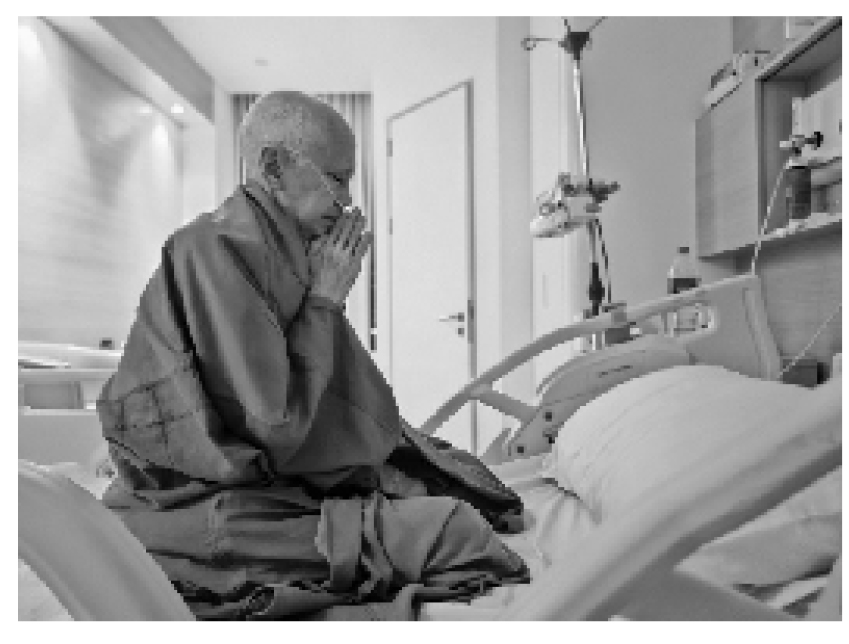
A secretly taken photo during his meditation session at the hospital in late September 2023, in the dim morning light.
Sài Gòn, October 8, 2023
Devoted Dharma disciples.


